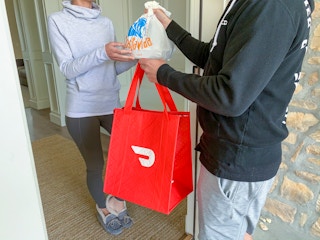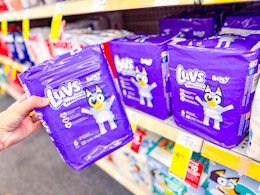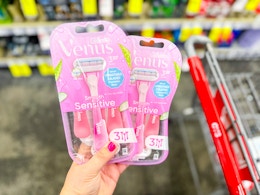At The Krazy Coupon Lady, we're all about saving every penny and dime. With that, we're also constantly looking for ways to make an extra buck or two.
That's why we compiled the only list you'll need to find the best side hustles, whether you can earn some passive income or free gift cards through reward points. Scroll down below for 100 side hustles you can start right now.
While we're on the topic of making money, we also have tips on how teens can earn cash and popular items you can sell for extra income.
And for more ways to make and save money, download The Krazy Coupon Lady app or text HACKS to 57299 .
These Websites Pay When You Take Surveys
101 Easy Side Hustles
Check out the following to find out how you can make easy money on the side.

1. Advertise Using Your Car: Drive around with sticker ads on your car and make money. Working with a company like Carvertise is an easy way to earn $450 to $1,500 per campaign.
2. Become a Dogsitter: If you’re comfortable welcoming a new furry pal into your home — or if you don’t mind going to their home — you can create an account on a site like Rover. Set your availability, rates, and types of pets you can work with, and you’ve got a nice little side income.
3. Try Drop Servicing: Essentially, drop servicing means you sell a service that you then outsource to a freelancer. Pay them and keep what’s left.
4. Become a Dropshipper: Dropshipping means that you list products for sale on your own online store. But you don’t actually carry the inventory, which means that the up-front investment is much smaller. When someone buys from you, the manufacturer ships the product directly to them, and you keep the profit. Shopify is a great resource and platform for dropshipping.
5. Deliver Food: Some drivers that deliver food like this type of side hustle so much that they’ve quit their regular jobs. Why? Driving through a service like Uber Eats allows you to set your own hours and choose which deliveries you accept. Plus, you keep 100% of the tips you earn.
6. Join the Rideshare Movement: If you don’t want to deliver food, you can deliver … people! Drive for Uber or Lyft for a flexible side hustle that nets you easy money. Tip: During peak hours, you can earn more.
7. Rent Out a Room in Your House: You don’t need to rent out your whole house to become an Airbnb host. If you have unused space, you can make recurring (and passive) income by renting it out to guests. Another way to make some passive income off your home is to rent out your pool with Swimply (the Airbnb of pools).
8. Rent Out Your Car: Did you know that you can rent out your vehicle? Check out Turo. It’s like Airbnb for cars, and you can earn money doing literally nothing. Visit their calculator to see how much you could earn.
9. Become a Professional Grocery Shopper: With Instacart, you go to the grocery store like you normally would, except you’re getting paid to shop for someone else. Set your own hours, and work as much or as little as you want.
10. Earn Rewards From Shopping: Use a credit card that gives you cash back, or try an app like Fetch, which you can use to scan your receipts and earn points you can redeem for gift cards or cash back.
11. Take Online Surveys: Will side hustles like taking surveys at Survey Junkie make you rich? No. Is it easy money? Yes! Make anywhere from $2 to $50 a survey.
12. Sell Your Old Stuff: One person’s junk is another person’s treasure. Sell your things on Craigslist, eBay, Facebook Marketplace, or Poshmark. If you’re not going to use it, you might as well make some money from it.
13. Become a Virtual Assistant: Flexible hours? Check. The ability to set your own rates? Check. A quick look at Upwork (which you can use to find jobs) reveals that some people are charging $100 an hour for this type of work.
14. Read Books: Calling all bookworms! You can get paid to read and review books. Check out this roundup from Reedsy on the best sites to explore.
15. Do Affiliate Marketing: With affiliate marketing, you promote someone else’s product or service through your own unique link. When someone in your audience purchases using that link, you get a cut of the sale. Think about brands, products, and services you love and check if they have an affiliate program.
16. Leverage User-Generated Content (UGC): User-generated content is such a powerful marketing tactic that brands are paying social media users to produce it. And no, you don’t need to be an influencer for these types of side hustles. UGC typically comes from average, everyday social media users.
17. Invest in Real Estate: There are various ways to invest in real estate, depending on how much money you have to work with. Even if you don’t have endless cash to invest, you can consider something like real estate crowdfunding.
18. Clean Houses: If you like making things sparkle, set an hourly rate (the average is $13.46) and roll up your sleeves. The more thorough and specific the cleaning, the more you can charge.
19. Buy and Resell Products: This is also called retail arbitrage. The concept is simple: Buy something cheap, sell it for more, and keep the profit. Learn more from Jungle Scout.
20. Sell Digital Products: Digital products like e-books, guides, tutorials, and ultimate lists are powerful — and passive! — ways to make money. Think about your community or audience, a problem they have, and how you can help them solve it. Consider keeping the price point low to encourage impulse purchases.
21. Make an Online Course: People buy courses about everything and anything. If you have any skill you can teach, you can make money from an online course. Baking, blogging, social media, home improvement — the list is endless. Use a platform like Thinkific to host your course.
22. Grow a YouTube Channel: Yes, this is more of a marathon and not a sprint. But if you enjoy creating videos and have valuable information to share, YouTube will pay you for it. Once you hit 1,000 subscribers and 4,000 hours of watch time within the last year, you can qualify for the YouTube Partner Program.
23. Transcribe Audio Files: Rev is one of many sites you can use for this. Work from where you want, when you want. The average earnings on Rev are $245 a month.
24. Rent Out Storage Space: Storage units can be expensive. If you have a spare room or even extra space in your garage, you can use it to make money. Check out this list of six ways to rent out your space.
25. Become a Mobile Notary: While the exact rates will vary, part-time mobile notaries can earn more than $31 an hour.
26. Join a Focus Group: Focus group side hustles can be interesting, entertaining, and a moneymaker. You can easily find studies that pay between $50 and $200 and even up to $1,200.
27. Become an Online English Tutor: The average income for an English tutor is about $52,000 a year. But you’re not required to do it full-time. Pick up a few hours by tutoring online. You can work with people all over the world.
28. Play Games on Your Smartphone: Yes, you can get paid to play games on your phone. You’re already on your phone for hours each day, anyway. Why not make some extra cash from it?
29. Join Amazon Flex: Drive for Amazon Flex and make $18 to $25 an hour.
30. Flip Domain Names: Buy domains as cheap as possible and sell them for a higher price point. Finding the right domains can mean striking cold. It can be a simple way of earning an extra $1,000 a year or more.
31. Test Out Products and Services: Join product testing panels and get paid with cash, free stuff, and gift cards. You can make anywhere from a few dollars to several hundreds per product test.
32. Complete Simple Tasks for People: Become a “tasker” on TaskRabbit, set your hourly rate, and get paid to do things like assemble furniture, plant flowers, and mount mirrors.
33. Start Your Own Coaching Business: Similar to online courses, think outside the box for this one. The key is to get specific. Who’s your target audience? Maybe you want to coach moms. What types of moms? New moms? Working moms? Single moms? Pick a niche and become the expert in it.
34. Become a Fiverr Freelancer: Not sure what services you could sell? Head to Fiverr and check out their various categories — especially Lifestyle, which includes things like cooking and crafting! Everyone has at least one service they can offer as a side hustle.
35. Start a Blog: There are numerous ways to monetize a blog, including running ads, using it to sell digital products, and affiliate marketing.
36. Walk Dogs in Your Neighborhood: If you prefer the company of 4-legged friends, dog walking is the perfect side hustle for you. Rover, and Wag make it easy to sign up, set an hourly rate, and walk pooches in your neighborhood.
37. Pick Up Hours as a Nanny: There are a couple of things to consider when setting your rates. Most nannies have an hourly rate, but some have an hourly rate per child. Pay will vary based on where you live but usually starts at around $17 an hour. Got a kid looking for a side hustle? They could offer part-time babysitting services .
38. Sell Used Smartphones: Use Gazelle to make money off of old gadgets. People are always looking for better deals on technology, meaning this side hustle is in demand.
39. Be Someone’s Personal Cook: If you’re a whiz in the kitchen and love feeding people, you can monetize it. The pay for personal cooks is about $27 an hour. Don’t forget to factor in the cost of supplies and ingredients — that’s typically on you to supply.
40. Become a Housesitter: Sites like MindMyHouse connect homeowners and housesitters around the world. Get paid to live — literally.
41. Try Print on Demand (POD): Similar to dropshipping, with Print-On-Demand (POD) services , you don’t need to carry inventory. When people order a print from you (a T-shirt, tote bag, mug, etc.), the printer will make the design, and the item will be shipped out. You keep the profit.
42. Sell Your Crafts on Etsy: If you enjoy making works of art by hand, Etsy might be the perfect side hustle for you.
43. Rent Out Parking Space: You can make $50 to $300 a month simply by offering a parking spot to someone in need. This works even better if you live some place touristy or where personal parking spots are in short supply.
44. Sell Canva Templates: You can make passive income by selling templates ready-made on sites like Canva, or you could accept orders for custom-made templates and charge a premium.
45. Teach People How to Drive: You need a license for this one — check out the DMV in your state/county. The average hourly pay hovers around $21.
46. Become an Ordained Minister: Here’s one of many feel-good side hustles. Help lovebirds say, “I do.” You can make anywhere from $500 to $850 for each wedding.
47. Refurbish Old Furniture: People are always trying to get rid of old furniture for cheap or free. Hit up garage sales, Facebook Marketplace, or even check what people leave on their curb. Repurpose it to give it a new life, and list it for sale online.
48. Host a Garage Sale: The key for hosting a garage sale is great planning and marketing. Do it on a weekend when more people are home. Put up signs around your neighborhood the Friday before telling people where to go. Share it on social media.
49. Work as a Wedding Planner: Wedding planners need to be incredibly organized with an eye for detail. If you can manage that, you might be able to make about $2,100 per wedding.
50. Do Peer-to-Peer Lending: Peer-to-peer lending means you loan money to borrowers without a financial institution (like a bank) acting as an intermediary. Borrowers need loans of all sizes, so you don’t necessarily have to invest a ton of money up front.
51. Invest the Simple (and Affordable) Way: Acorns lets you invest spare change so you can put your money to work for you.
52. Show Tourists Around: If you live in a tourist destination, like Las Vegas, you can charge an hourly rate to show people around the must-see spots. The average hourly wage is about $22, and that’s not including tips.
53. Carry Out Simple Yard Work: Charge by the hour, task, or size of the yard. Mow lawns , trim hedges, pull weeds, or tend gardens.
54. Sell Your Handyperson Services: You can easily charge around $21 an hour (and up) to handle handiwork around people’s homes. Think of tasks like fixing leaky sinks, hanging pictures, installing ceiling fans, and correcting a running toilet.
55. Plan and Book Trips: People love vacations. Not everyone loves planning vacations. Charge $24 an hour or more to handle all of the logistics for your clients.
56. Start a Subscription Box Service: Subscription boxes are a smart way to make recurring and mostly passive income. Pick something you enjoy and know a lot about so that you’ll better understand your audience.
57. Sell Your Plasma: Earning up to $200 per donation makes plasma donation one of the better-paying side hustles; plus, your gesture can help save lives! You can donate once in a 2-day period and no more than twice a week.
58. Write Product Descriptions: You don’t need to be the best writer in the world to pull this off. Sell them in batches to e-commerce brands to increase your earning potential.
59. Sell Your Pictures: For people who are comfortable behind the lens, you can submit your pictures to sites like Shutterstock and get paid when people download them.
60. Rent Out Your Gear, Machinery, and Equipment: Do you have expensive lawn equipment, gym machinery, or tools that you’re not always using? Rent them out for passive income, and treat them as individual investments.
61. Get Your Real Estate License: Getting your license opens you up to a world of opportunities — like buying, selling, renting, and flipping homes.
62. Pick Up Garbage: As far as side hustles go, this one requires little start-up costs outside of some garbage bags and gloves. Offer your services to companies and property management teams to maximize your profit. Set an hourly rate or base it on the square footage of the lot.
63. Get Paid as an Airbnb ‘Co-host’: Co-hosts help listing owners with the logistics of renting out space. For instance, they might monitor the listing and make sure guests are taken care of during their stay. Co-hosts work with hosts to decide their exact responsibilities.
64. Get Paid as an Airbnb ‘Co-host’: Becoming a secret shopper offers a flexible schedule, and you can make up to $15 a pop.
65. Do Product Reviews: A number of brands and marketplaces will reward you for reviewing products. You get free stuff plus a monetary reward in the form of cash, gift cards, or redeemable points.
66. Sell Private Labeled Products: This means you buy a blank, unbranded product and brand it with your own logo. You’ll usually be responsible for the packaging, too. Sell your products on a marketplace like Amazon.
67. Coach or Referee Local Games: Coaching local middle school or high school sports may bring in some cash. How much you make will depend on a number of factors. But a quick Google search tells us that you can make $50 or more a game. (You’ll probably get a good workout in, too. Bonus!)
68. Clean Pools: Make $15 an hour and up. Some owners might already have the necessary equipment and products, but be sure to check in advance and factor that into the cost of doing business.
69. Organize and Declutter People’s Homes: When decluttering or organizing someone’s home, you charge by the hour or based on the size of the room. Factor in variables like the cost of supplies — cleaning products, labels, and so on.
70. Write Cover Letters and Resumes: Especially these days, people need all the help they can get applying for jobs. Charge per cover letter/resume and sell your services on a site like Fiverr.
71. Be a Brand Ambassador: Job boards and even Craigslist are packed with companies who want to hire individuals to promote their products and services. Pay is typically hourly (with an average of $24) or per event.
72. Offer Pressure Washing Services: Pressure washers range from less than $100 to several hundred dollars, depending on the quality and features. Invest a little money upfront and then see a nice ROI by offering it as a service to people around the neighborhood at an hourly rate.
73. Clean Gutters: The average rate is $0.40 - $2.15 per linear foot, which adds up fast. And if you live in a wooded area that gets a lot of rain, you’ll be very busy.
74. Pick Up Dog Poo: For one of the crappy side hustles (see what we did there?!) Pooper will pay you per scoop. No, really. This company has beta programs going on in San Francisco, Los Angeles, and New York.
75. Inspect Homes: Home inspections can make you about $500 each, although it varies by home and state. Note that this requires training and certification before you can get started.
76. Deliver Flyers: This is something businesses always need. You can charge by the hour, distance, or based on how many they want you to pass out.
77. Get Paid to Be in a Wedding Party: Become a professional bridesmaid and get paid to party.
78. Clean Windows: You can make about $18 an hour and even more if you’re dealing with taller homes and buildings.
79. Work as a Doula: Doulas provide physical and emotional support to women before, during, and shortly after they give birth. In bigger cities, doulas can earn $1,600 to $2,000 per birth. You do need to become a certified doula — check out the requirements here.
80. Spin Signs: These side hustles usually pay per event or by the hour. Wages will range depending on the event. But considering you need minimal knowledge to do this, it’s an easy side hustle to earn extra cash.
81. Offer Translation Services: Do you speak two languages? You can monetize this and make about $28 an hour
82. Dress Up for Kids’ Parties: Hourly rates range from $10 to about $50, depending on the character you’re portraying and what your services include. The up-front investment is the costume and any accessories, plus gas to get to the parties.
83. Turn Your Yard Into a Dog Park: Charge an hourly rate or even a monthly membership fee. Just be sure that your HOA/property management allows it!
84. Host Trivia Night: Work the crowd, get people excited, and get paid to have a good time. Trivia hosts can get paid by the hour (starting at around $25) or per event, which can be a couple of hundred dollars easily.
85. Do Other People’s Laundry: Come up with a rate per load. Do it at home or at your local laundromat. Upsell with services like ironing, steaming, and folding.
86. Invest in Vending Machines: As far as side hustles go, this one is pretty hands-off. Plan to invest about $2,000 up front, plus the cost of continued inventory. However, this is a nice way to make mostly passive income on the side.
87. Stand in Line for People: Most people hate standing in line. Imagine what the demand is like on popular sale days like Black Friday. Charge an hourly rate to hold people’s place in line. The longer the line, the more you can charge. While standing there, use some apps to earn even more money .
88. Participate in Research and Studies: Paid studies are a simple way to supplement your income. This can include surveys, market research, and lab research.
89. Be a TV or Movie Extra: Work with a talent agency or use an online service like Central Casting. Pay ranges for side hustles like these run from minimum wage to about $50 an hour, and you might get some serious screen time.
90. DJ at Local Events: The average wage for a DJ is about $41 an hour. Of course, the more in demand you are, the more you can charge.
91. Pick Up Data Entry Work: The average hourly wage is about $23, hours are flexible, and you can work from home . Plus, the work tends to be pretty straightforward, making data entry one of the more popular side hustles.
92. Be Someone’s Friend: Rent a Friend connects people who need a buddy in their area. There are similar sites where you can make money being someone’s virtual friend, too.
93. Flip Cars: You can make, on average, about $500 - $2,000 per car. Look for cars for cheap on sites like Craigslist and OfferUp. Be sure to factor in what repairs and upgrades will cost you. Don’t want to sell? Rent out your car and earn some passive income.
94. Hang Up Holiday Lights: Charge by the hour or foot. Make extra money during the holidays — when a lot of us really need the extra cash — and make as much as $15,000 for the season.
95. Flip Websites: Similar to flipping houses, you can flip websites. Buy or create them, make improvements, and sell them for a profit.
96. Stage Houses Before They’re Listed for Sale: Earn anywhere from $500 to $5,000 per project. It’ll vary depending on the number of rooms you stage and the square footage.
97. Provide Mobile Oil Changes: You might need to spend up to $10,000 to get going, and you can charge customers about $20 to $55 per oil change.
98. Sell Your Cuddles: Definitely one of our stranger side hustles, but nonetheless, a chance for you to make a few bucks with little effort. Yes, you can get paid to cuddle. Cuddle Comfort helps connect you with clients, and you keep 85% of the total price.
99. Run an Online Workshop or Masterclass: We’re willing to bet that you have certain knowledge you can monetize. Are you great at cooking? Home DIY projects? Speaking a second language? Hold a class for a couple of hours or even a full weekend and charge people for admission. Workshops and masterclasses can range from $50 a pop to several hundred or thousand dollars, depending on what you’re teaching and how in demand you are.
100. Recycle, Don’t Trash It!: There are all sorts of ways to make money recycling. Sell your old Amazon boxes, empty ink cartridges, and scrap metal.
Related Reading
Download the KCL app to add and redeem coupons in store
































































































